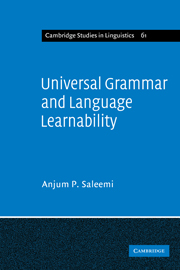Book contents
- Frontmatter
- Contents
- Preface
- 1 The problem of language learnability
- 2 The components of the linguistic system
- 3 The components of the learning system
- 4 Approaches to parameter fixation
- 5 The scope and limits of the current approaches
- 6 The distribution and variety of null subjects
- 7 Augmented parameter fixation: pro subjects and learnability
- 8 Review and integration
- Notes
- References
- Index
7 - Augmented parameter fixation: pro subjects and learnability
Published online by Cambridge University Press: 04 August 2010
- Frontmatter
- Contents
- Preface
- 1 The problem of language learnability
- 2 The components of the linguistic system
- 3 The components of the learning system
- 4 Approaches to parameter fixation
- 5 The scope and limits of the current approaches
- 6 The distribution and variety of null subjects
- 7 Augmented parameter fixation: pro subjects and learnability
- 8 Review and integration
- Notes
- References
- Index
Summary
The null-subject parameter, as formulated in the last chapter, defines four types of languages, i.e.: (a) those totally without null subjects, (b) those in which nonarguments alone are allowed to be null, (c) those permitting all pleonastic subjects (nonarguments or quasi-arguments) to remain phonetically empty, and (d) those in which all manner of subjects may be null, with the optionally null pleonastics often displaying the tendency not to be overtly realized. As a result, the parameter raises the interesting question of the relationship between parameters and the languages they generate, and of the resulting implications for learnability, with renewed force. It affords an example of the intricate connection between parameter values and the corresponding languages, in particular of a mismatch between the two, perhaps suggesting that parameters do not, strictly speaking, generate languages, but only fix the maximal bounds within which languages can be realized. This possibility is analogous to the familiar case of potential and actual forms, of structures that are predicted to be well formed by a grammar but that do not exist (cf. Pinker 1989:98ff). This gives rise to some inconsistency between the training instances available to the learner and the relevant generalization in the grammar. The parameter in question illustrates that this state of affairs is possible in a parametric theory as well, resulting in a comparable learnability paradox that we are going to consider in this chapter.
- Type
- Chapter
- Information
- Universal Grammar and Language Learnability , pp. 112 - 135Publisher: Cambridge University PressPrint publication year: 1992



